
by Admin | May 28, 2014 | Editorial Board

Member of Editorial Board, Boston Global Forum, Professor of Department of Political Science, Northeastern University
Suzanne Ogden is a Professor in the Department of Political Science, and a Faculty Associate in the Center for Emerging Markets, Northeastern University. She is also a Research Associate in Harvard’s Fairbank Center for Chinese Studies. As a China specialist, she has focused primarily on the interplay of culture, development, and politics.
Prof. Ogden is best known for her books Inklings of Democracy in China; China’s Unresolved Issues; 11 editions of Global Studies: China; and China’s Search for Democracy: The Student and Mass Movement of 1989 (the last co-authored with Kate Hartford, Lawrence Sullivan and David Zweig). In recent years, she has shifted her research focus to research on China’s role in the Mekong River Basin and the Greater Mekong Subregion.
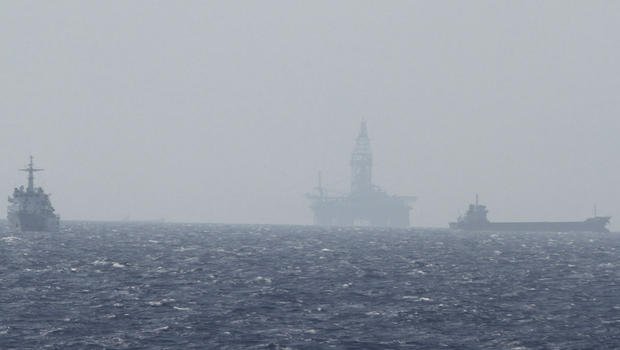
by Admin | May 28, 2014 | Highlights
Over the past two years, the world has watched the escalating tensions in the East and South China Sea. There are disputes and conflicts between China and its neighbors – Japan, Vietnam, and the Philippines. These situations are threatening peace, stability, and maritime security and safety in the East and South China Sea.
In order to help ease tensions, the Boston Global Forum builds up the Boston Global Forum Initiative to resolve this issue, and call for peace in the East and South China Sea. The Initiative’s mission is to alleviate the threat of war in the region by facilitating open dialogue amongst involved nations. In doing so, BGF will hold an international conference with leaders from the United States, Asia, and the United Nations. Distinguished Professors, Michael Dukakis and Joseph Nye, will moderate the discussion, and BGF calls on Secretary of State John Kerry to host the event. Due to the travel schedules of many participants, the conference will either take place on July 2, 2014, in Boston, MA or will occur remotely. Like all BGF events, the conference will be live-streamed so that global citizens can join the conversation through social media and the BGF website.
In addition to the conference, the Boston Global Forum Initiative seeks an immediate international response to the escalating crises in Asia and urges the United States and the European Union to deploy naval ships to the region as observers, particularly toward the Chinese HD981 oil rig, which has ventured into Vietnamese waters, and risks sparking a war between China and Vietnam.
The Boston Global Forum recently announced its new Global Media Award and will soon uncover its new Global Art Competition; both contests are part of the overall Initiative to bring peace and stability to the region of the East and South China Sea.
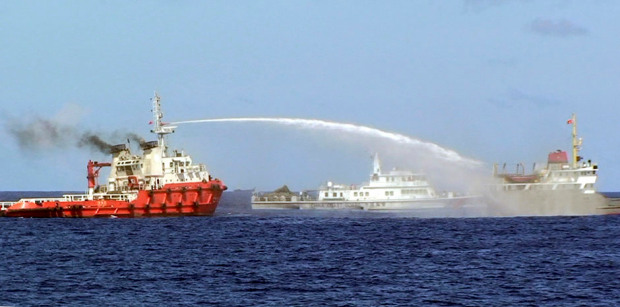
by Admin | May 27, 2014 | Highlights

(Photo Credit: AP/Vietnam Coast Guard)
CONTACT: Tuan Nguyen
May 27, 2014
Boston Global Forum [email protected]
Boston Global Forum announces new Initiative; Plans international conference re urgency in East and South China Sea
Cambridge, MA – Today, the Boston Global Forum (BGF) announced its new Boston Global Forum Initiative to take swift action for a call to peace in the East and South China Sea. The escalating tensions between Japan and China; China and Vietnam; and China and the Philippines threaten regional stability and security.
The Initiative’s mission is to alleviate the threat of war in the region by facilitating open dialogue amongst involved nations. In doing so, BGF will hold an international conference with leaders from the United States, Asia, and the United Nations. Distinguished Professors, Michael Dukakis and Joseph Nye, will moderate the discussion, and BGF calls on Secretary of State John Kerry to host the event. Due to the travel schedules of many participants, the conference will either take place on July 2, 2014, in Boston, MA or will occur remotely. Like all BGF events, the conference will be live-streamed so that global citizens can join the conversation through social media and the BGF website.
In addition to the conference, the Boston Global Forum Initiative seeks an immediate international response to the escalating crises in Asia and urges the United States and the European Union to deploy naval ships to the region as observers, particularly toward the Chinese HD981 oil rig, which has ventured into waters claimed by Vietnam, and risks sparking a war between China and Vietnam.
The Boston Global Forum recently announced its new Global Media Award and will soon uncover its new Global Art Competition; both contests are part of the overall Initiative to bring peace and stability to the region of the East and South China Sea.
For more information, the media can contact the event organizer direct at [email protected]/
###
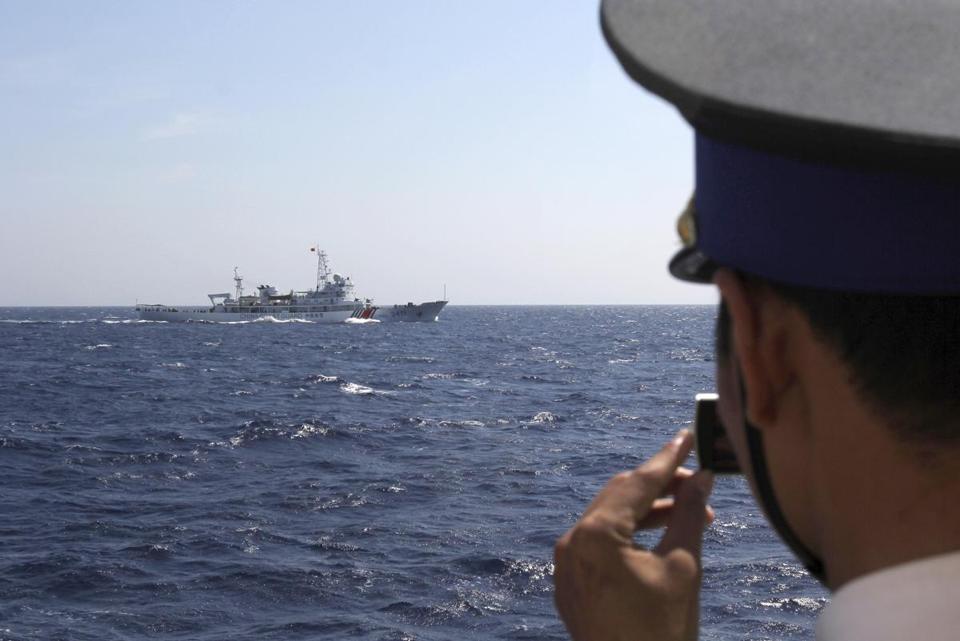
by Admin | May 27, 2014 | News

(Photo Credit: AFP/Getty Images)
(BGF) – Recently The Boston Globe published an article discussing Vietnam’s history of conflict with, and resistance against, China. In light of Vietnam’s long history of resisting Chinese actions, H.D.S. Greenway argues that, although Vietnam does not compare to China’s military power, it should come as no surprise that Vietnam will prove to be a difficult neighbor for China to push around. Click here to read the full article or visit The Boston Globe‘s website.
Vietnam Won’t Be Pushed Around By China
By H.D.S Greenway
VIETNAM MAY prove harder to push around than some of China’s other maritime neighbors in contested waters. Vietnamese and Chinese ships recently rammed each other and fired water cannons to contest China’s bringing in a giant oil rig off the barren sandspits called the Paracel Archipelago that both claim in the South China Sea. It was not the first such confrontation.
Forty years ago, when there was still a South Vietnam, I watched South Vietnamese war ships holed by gunfire limp home into the port of Danang. They had not been fighting their mortal enemy, North Vietnam. They had clashed with Chinese forces off those same disputed Paracel islands that lie about equidistant from the Chinese and Vietnamese coasts. China made a big fuss over the confrontation at the time, saying its forces had protected the motherland. South Vietnam scored a propaganda victory over Hanoi by calling upon all Vietnamese, of whatever political persuasion, to denounce the Chinese occupation of sacred Vietnamese soil.
The following year, as North Vietnamese forces were closing in on Saigon and South Vietnam was in its death throes, the North Vietnamese attacked and displaced a small South Vietnamese garrison on the Spratly Islands further south which were, and are today, also claimed by China as well as Vietnam, the Philippines, and even tiny Brunei. The significance was that, even though the war between the two Vietnams was still raging, Hanoi made the decision to steal a march on China, its vital ally, just to make sure that, once the war was over, a Vietnamese garrison remained on the remote islands Vietnam claimed.
In 1979 China actually attacked Vietnam along its northern border, not over islands in the South China Sea, but in order to punish Vietnam for its invasion of Cambodia in order to oust the loathsome Khmer Rouge regime, a China ally. In that encounter the Chinese army received a bloody nose from the more battle-hardened Vietnamese.
Many of Vietnam’s traditional heroes, such as the Trung sisters in the first century AD and Le Loi in the 15th century, gained their place in history for anti-Chinese resistance. China occupied Vietnam for nearly 1,000 years from the first century BC until the 10th century AD. There were other periodic Chinese invasions during the Ming Dynasty.
After World War II the Chinese were back again when Chiang Kai-shek’s troops were tasked with disarming the Japanese in the north. When Ho Chi Minh was criticized by Vietnamese nationalists for agreeing to have the French return to their old colony to replace Chinese troops, Ho told them that European colonialism was dying. He said he would rather smell French excrement for a few years more than Chinese excrement for another millennium.
Click here to continue reading.
by Admin | May 27, 2014 | News
(BGF) – As the Philippines’ InterAskon News reported, China has transferred two destroyers, with one each to operate in the East and South China Seas and nine other ex-navy vessels, including tugs, icebreakers and survey ships to its maritime surveillance fleet in a move to strengthen up its position in bitter territorial rows with Japan and other neighbours.
Beijing has been sending maritime patrol vessels into waters around the East China Sea islands – which it claims as the Diaoyu and which Japan controls and calls the Senkaku.
Click here to read the full story or visit the InterAskon website.
China sends destroyers to boost ‘surveillance’ ops in South China Sea
31 December, 2012 | By Agence France-Presse
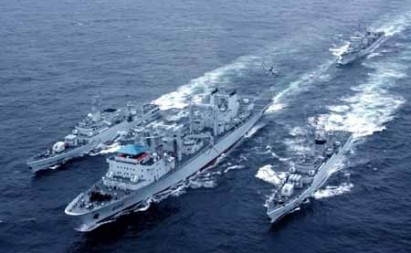 Chinese navy vessels. (Photo Credit: Agence France-Presse)
Chinese navy vessels. (Photo Credit: Agence France-Presse)
BEIJING – China has transferred two destroyers and nine other ex-navy vessels to its maritime surveillance fleet, reports said Monday, as it moves to beef up its position in bitter territorial rows with Japan and other neighbours.
Beijing renovated the ships and transferred them to surveillance operations to “alleviate the insufficiency of vessels used to protect maritime interests”, said a report on Tencent, one of China’s major news portals.
China is embroiled in a maritime dispute with Japan that has seen tensions between the two Asian giants, the world’s second- and third-largest economies, at times reach fever pitch.
It is also engaged in a simmering row with its southern neighbours over its claim to vast swathes of the South China Sea.
Beijing has been sending maritime patrol vessels into waters around the East China Sea islands – which it claims as the Diaoyu and which Japan controls and calls the Senkaku – since Tokyo nationalised the chain in September.
China is apparently seeking to prove it can come and go in the area at will and on Monday three of Beijing’s ships were spotted in the waters around the islands, according to Japan’s coastguard, in the latest perceived incursion.
Click here to continue reading.
by Admin | May 27, 2014 | News
(BGF) – China insisted that its activities in the South China Sea were the “inherent right of the country” and that they are all “in accordance with international law and historical evidence”‘, neglected the U.S., Japan and other regional powers’ urges to address conflicting territorial claims in the South China Sea based on international law, not with threats or historical claims.
Click here to read more or visit the Kyodo News website.
U.S., Japan press China to respect int’l law over S. China Sea row
July 12,2012 | By Ko Hirano and Varunee Torsricharoen
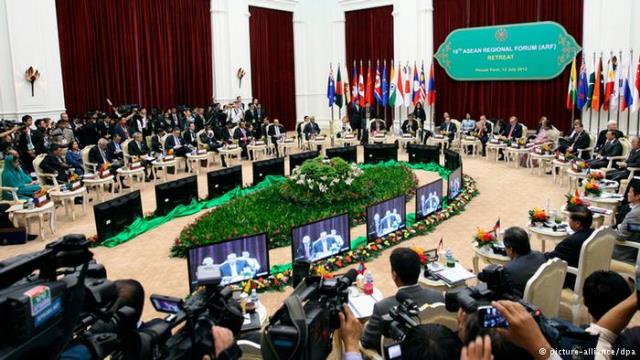 (Photo Credit: AFP)
(Photo Credit: AFP)
Phnom Penh (Kyodo) – The United States, Japan and other regional powers pressed China at a regional security forum on Thursday to address conflicting territorial claims in the South China Sea based on international law, not with threats or historical claims.
Foreign ministers of the 27-member ASEAN Regional Forum expressed hope that Beijing and the 10-member Association of Southeast Asian Nations will launch negotiations at an early time for a binding “code of conduct,” a set of rules to regulate claimant states’ activities and behavior in the South China Sea, delegates said.
“We believe the nations of the region should work collaboratively and diplomatically to resolve disputes without coercion, without intimidation, without threats and certainly without the use of force,” U.S. Secretary of State Hillary Clinton said at a news conference after the ARF ended.
“No nation can fail to be concerned by the increase in tensions, the uptick in confrontational rhetoric and disagreements over resource exploitation,” Clinton said.
Click here to continue reading.
by Admin | May 27, 2014 | News
(BGF) – The Philippines’ Foreign Secretary Albert del Rosario said in a press briefing that the Philippines will “secure sovereignty” if it is challenged, as the Inquirer reported. The remark is made after the Philippines Navy surveillance plane found eight Chinese fishing boats anchored inside the Scarborough Shoal, which is protected by two Chinese maritime surveillance ships.
Click here to read the full article or visit the Inquirer’s website.
Philippines to ‘secure sovereignty’ if challenged by China
April 11, 2012
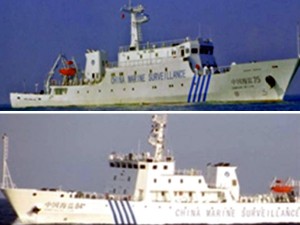
A view of Chinese surveillance ships in a standoff with a Philippine warship on the Scarborough Shoal after eight Chinese fishing boats were caught poaching in the disputed territory. The photo was presented by Vice Admiral Alexander Pama, flag officer-in-command, during a press briefing Wednesday April 11, 2012, at the Department of Foreign Affairs. (Photo Credit: PHILIPPINE NAVY HANDOUT)
MANILA, Philippines – The Philippines will defend its sovereignty if challenged by China, Foreign Secretary Albert del Rosario said Wednesday as a Philippine warship was locked in a standoff with two Chinese vessels.
“If the Philippines is challenged, we are prepared to secure our sovereignty,” Del Rosario told reporters in a briefing at the Department of Foreign Affairs.
At the same time, Del Rosario said the Philippines has filed a diplomatic protest.
Del Rosario said he and Chinese Ambassador Ma Keqing met at the DFA earlier in the day to discuss the situation.
A statement from the Department of Foreign Affairs said the confrontation happened two days after a Philippine Navy surveillance plane found the eight Chinese fishing boats anchored inside the Panatag (Scarborough) Shoal on April 8.
According to the DFA, the Panatag Shoal is an integral part of Philippine territory.
“The Shoal is 124 nautical miles from the nearest basepoint in Zambales province. It is within the Philippines’ 200 nautical miles Exclusive Economic Zone (EEZ) and Continental Shelf,” the DFA said.
Click here to continue reading.
This situation has remained unchanged as of Wednesday morning, the DFA noted.
by Admin | May 27, 2014 | News
(BGF) – Joshep Santolan for the World Socialist Web site reported that tension escalated in the South China Sea after the Philippines government announced that it would deploy the oil exploration plan in the waters which are also claimed by China. Vietnam also alleged Chinese naval forces to assault 11 Vietnamese fishermen as they sought shelter from a storm in the Paracel Islands. China rejected Manila’s right to explore oil and gas and denied Hanoi’s allegation.
Click here to read the full story or visit the World Socialist’s website.
South China Sea tensions mount as Manila prepares to drill for oil
March 02, 2012 | By Joseph Santolan
Tense rivalry in the South China Sea escalated over the past week. The Philippine government announced it would go ahead with plans to open several quadrants of the disputed waters for oil drilling in coming months. The Vietnamese government denounced the Chinese naval forces for conducting “an assault” on 11 fishermen seeking refuge in a storm. The Chinese foreign ministry rejected Manila’s right to drill for oil and denied Hanoi’s allegations.
Behind all these tensions lie the machinations of Washington, which has ratcheted up its pressure on Beijing militarily, economically and politically throughout the region.
On Tuesday Jose Almendras, Secretary of the Philippine Department of Energy, announced that the Philippines had invited major foreign oil corporations to invest an estimated $US7.5 billion in exploration. Two of the proposed sites are in the vicinity of the Reed Bank and are also claimed by China. According to the Wall Street Journal, seismic data indicates that there are 3.4 trillion cubic feet of gas-in-place and 440 million barrels of oil in the area.
The Reed Bank was the site of a serious confrontation between China and the Philippines in March 2011, when an oil exploration ship operated by Forum Energy was confronted by two Chinese gunboats. The Philippine government dispatched a bomber and light aircraft to respond. This confrontation has been used repeatedly by Pentagon officials and the US State Department as a justification for an increased US military presence in the region.
Click here to continue reading.
by Admin | May 27, 2014 | News
(BGF) – As the China Daily reported, China’s Foreign Ministry spokesman Hong Lei said that freedom and safety of navigation had never been affected by the South China Sea disputes in response to the United States’ latest claim that China remains “aggressive” to vessels conducting oil and gas exploration in disputed waters in the South China Sea, and implied to the U.S that “non-claimant states” should do more things that are beneficial to regional peace and stability.
Click here to read the full story or visit the China Daily website.
Beijing ‘consistent’ on S. China Sea: FM
March 01, 2012 | By Cheng Guangjin
BEIJING – Freedom of navigation in the South China Sea “has never been a problem” and related countries should do more to protect peace and stability in the region, Foreign Ministry spokesman Hong Lei said on Wednesday.
Hong made the remarks in response to the United States’ latest claim that China remains “aggressive” to vessels conducting oil and gas exploration in disputed waters in the South China Sea.
According to the Associated Press, Admiral Robert Willard, head of the US Pacific Command, said on Tuesday that the American military must be present in the South China Sea to ensure the security of the sea lanes crucial to international trade.
“In fact, freedom and safety of navigation in the South China Sea has never been a problem, and has never been affected by the South China Sea disputes. We hope relevant parties, including non-claimant states, do more things that are beneficial to regional peace and stability,” Hong said at a regular news conference.
China, the Philippines, Vietnam, Malaysia and Brunei all have claims over some islands and waters in the South China Sea, and the US has increased its presence in the Asia-Pacific region, claiming that it has a national interest in the peaceful resolution of disputes in the South China Sea.
Willard told the Senate Armed Services Committee that China was less confrontational in 2011 in asserting its claims in the South China Sea than it was in 2010, when tensions rose between it and other claimant states, according to the AP.
Click here to continue reading.







